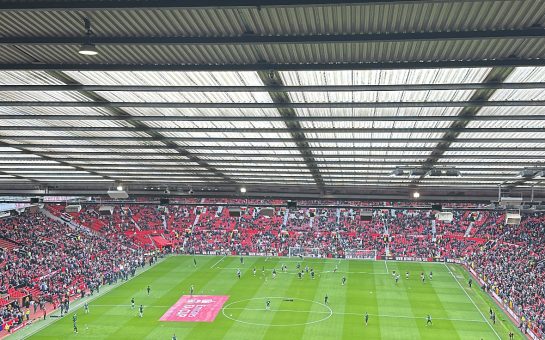Jodrell Bank may be surrounded by sleepy green fields, but the historic science centre’s reputation extends far beyond its home in the heart of Cheshire.
Now the storied past of the internationally-renowned observatory in the North West is being celebrated with a massive injection of funding, to the tune of £20.5m.
The money is dedicated to the First Light project, which involves the design and construction of a completely new building to showcase of Jodrell Bank’s revolutionary role in the arena of modern astronomy.
Dr Teresa Anderson, the Director of Jodrell Bank, led the campaign for the investment. Starting with a team of just five people in 2010, the group has this year reached the 50s in order to handle the scale of the undertaking.
She explained that the gallery will focus on the discoveries of radio astronomy in the 1950s, which she believes was the next great “leap forward” in the field following the work of the early star-gazers.
#OTD 60 yrs ago, the Lovell Telescope (the Mark I as it was then) received its first signals from space (Lovell: The Story of Jodrell Bank) pic.twitter.com/VtkCdlZpNn
— Jodrell Bank (@jodrellbank) August 2, 2017
Radio astronomy was pioneered by the observatory at the dawn of the Space Age, paving the way for our understanding of the universe today.
In fact, the theme is so deeply embedded into history of the centre that Dr Anderson noted how visitors can find memories from the era across the site: “It still has all the traces of that new science.”
However, there are concerns that visitors may not gravitate towards the older subject matter. In December, the Department for Digital, Media, Culture and Sport published the Taking Part Survey for England, assessing public interaction with cultural activities such as Jodrell Bank. The report showed that from 2016 to 2017, 47.9% of adults had visited a museum at least once in the last year, a 5% decrease from the previous year.
Dr Anderson responded by saying that the exhibition will create renewed interest by touching on the technology of today which would not exist without the advances of radio astronomy, including mobile phones and space tourism.
Responding to concerns that young visitors may not gravitate towards the subject matter, Dr Anderson said the exhibition will touch on the technology of today which would not exist without the advances of radio astronomy, such as mobile phones and the move towards space tourism.
The exhibition will also feature the older aspects in conjunction with state of the art projections, to push the displays into the future and make the materials as interactive as possible.
The financial support of the exhibition and learning space comes from a patchwork of sponsors.
Of the total sum, £16.1m is from The Heritage Lottery Fund and the Department for Digital, Culture, Media and Sport. A further £4m has also been provided in the government budget, but perhaps most impressive, is the £12.1m given by National Lottery players themselves.
Dr Anderson shared that she initially felt a little frustrated that Jodrell Bank didn’t receive immediate support from the state based on its record of research and leadership in the UK’s space industry.
Yet, the National Lottery backing has now changed her mind, as it makes the destination more accountable to its visitors:
She said: “It sort of like we’re crowd-funded, it keeps you real.”
UNESCO WORLD HERITAGE NOMINATION
And the number of visitors are only set to increase. Dr Anderson expects that the development will more add to the centre’s figures substantially, from 140,000 in 2014 to 180,000 after First Light opens.
First Light is not the only reason it has been a busy year for the team at Jodrell Bank. They may have won funding to power their next major plan but they have also secured a formal nomination to be the next UNESCO World Heritage Site in the UK, in recognition of the groundbreaking explorations carried out as the observatory since its inception.
Dr Anderson spoke of the hard won victories: “It’s been a huge amount of work, we’ve been on the [UNESCO] shortlist since about 2010, so it’s fantastic to get to this point.”
The Director also expressed her relief that the push for funding has also finally paid off: “I think I’ve lost two years of my life!”
You can now read our World Heritage Site nomination document online at https://t.co/70CTq5PgTL
— Jodrell Bank (@jodrellbank) June 2, 2018
For Dr Anderson, looking to the future of First Light whilst honouring the past through a UNESCO nomination goes hand in hand.
She continued: “Because Jodrell Bank is so unique, it’s obviously a science site, but it’s also about heritage.”
In fact, part of the heritage to be commemorated, Dr Anderson emphasised, has nothing to do with realm of science. Instead, she highlighted the importance of the iconic Lovell telescope in the landscape of the North West: “It reminds us of home when we see it.”
Meanwhile, the monetary milestone might have been achieved, but there is no sign of activity slowing down, next month the centre will welcome back its very own festival for the third time.
The grounds of the observatory will play host to Bluedot: a cross-cultural combination of learning experiences and special musical guests.
The monetary milestone might have been achieved, but there is no sign of activity slowing down.
Have you seen this year’s incredible line up for @bluedotfestival yet? Tickets are on sale now Launching into space soon!
Info: https://t.co/dEitYW7xul pic.twitter.com/0kRCv1n0lN
— UoMSalcStudents (@uomsalcstudents) June 1, 2018
Image courtesy of Jodrell Bank via Twitter, with thanks.



